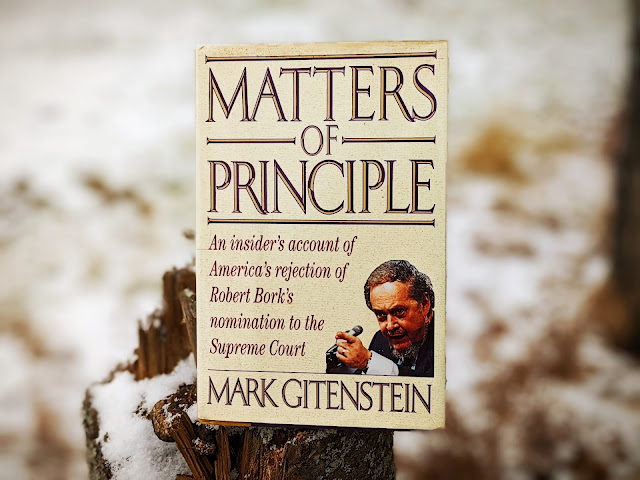
Matters of Principle by Mark Gitenstein
You can probably tell from the photo above that it's been snowing already here in Michigan's Upper Peninsula. But that's okay, because what better weather is there than a snowstorm to hunker down with a good book and a cup of your favorite warm beverage? My choice for a few evenings this past week was hot tea and Mark Gitenstein's Matters of Principle.
WHY THIS BOOK?
Joe Biden's personal life, including the loss of his first wife and daughter, and then later the loss of his son, along with his personal attributes (compassion, empathy) were all over the news during the 2020 presidential campaign. As the campaign ended I picked up Promise Me, Dad - Biden's own account of his son Beau's fight with cancer and its impact on his decision not to enter the Presidential race in 2016. I read and reviewed that book way back in January.
About that time I also picked up this book in the hopes of learning more about Biden's career. But, as the book seemed like it would be a bit dry, I let it sit on my TBR until now.
Published in 1992 this book is more or less a rebuttal to Judge Robert Bork's bestseller The Tempting of America, in which he portrays himself as a mainstream judicial nominee whose "originalist" philosophy was wrongly characterized in his failure to be approved to the Supreme Court by Joe Biden's Senate Judiciary Committee and the full United States Senate. Gitenstein begs to differ.
THE BOOK
1987 was a pivotal year in the career of our current president, Joe Biden. That was the year that Biden started his first run for the Presidency. He also successfully led the effort to defeat the nomination of Robert Bork to the Supreme Court. Balancing both a Presidential run and his responsibilities as the chair of the Senate Judiciary Committee became more politically untenable as the year went on, and this reality, coupled with the plagiarism accusations that arose on the campaign trail, prompted Biden to drop his Presidential bid.
Gitenstein served as the legal counsel to the Judiciary Committee and is a long-term confidant of Joe Biden. He spends most of his time in this book on the second major event for Biden that year - his leadership of the Judiciary Committee in turning back Bork's nomination.
The book has two main thrusts. First, it outlines how Biden and his team approached the nomination. As Gitenstein relates it, Biden wanted first of all for the process be seen as fair by all involved. But he had some fundamental concerns about Bork's writings and judicial philosophy, and spent a good amount of his prep time for the nomination hearings trying to find a way to express those concerns so that they would be relatable to folks who "don't have Yale Law degrees", i.e., the majority of those tuning in to watch the hearings on television.
The second focus of Gitenstein's book is explaining Bork's judicial philosophy, and his writings and speeches, and the concerns raised by them. I can't do it justice (no pun intended) in a short review, but basically Bork was an "originalist" who took the narrow view that the law only meant what the words on paper said, or could only be interpreted based on the intent of those who wrote the laws down, as evidenced by records available to us. Thus, he took the position that if the Constitution did not spell out a right explicitly, then such a right simply did not exist. This means that Bork found no right to privacy in the Constitution, which led to no right of married couples to make private decisions on birth control. It also meant that Bork found no basis in the Constitution for the Federal role in ending segregation. Indeed, most civil rights law Bork felt was on "shaky ground". And he had been pretty explicit in his speeches about his willingness, should he have the chance, of overturning Supreme Court precedents.
Thus, Bork's philosophy was at odds with the long-standing tradition, even preceding the Constitution, and best summarized in the Declaration of Independence, that people have certain "inalienable rights" that governments cannot take from them, whether those rights are explicitly written down or not. That's clearly not a popular notion, and based on that, his nomination was in trouble from the start.
Gitenstein also covers the political strategy that led to Bork being nominated, and goes into some depth on the plagiarism accusations, which were really more of a dust up than a scandal, even if the press played them very seriously.
MY TAKE ON THE BOOK
If you are a history junkie, or a political junkie, and you have a good working understanding of the ways of Washington then this book is in your wheelhouse. If you are like me and looking for more understanding of the career of our current President, or aren't old enough to remember the Bork nomination, than this book is good history lesson.
I am old enough to remember (vaguely) the Bork nomination, and I think that added to my experience with the book. It is not a pop press "tell all" book. In fact, its a bit dry. So for that reason I give 3 of 5 Stars ⭐⭐⭐ to Matters of Principle.
Matters of Principle links:
📙 Borrow this book: Find out if your library has the ebook or audiobook available.
📘 Buy this book: Amazon | Barnes & Noble | Books-A-Million | AbeBooks | Powells | ThriftBooks
📗 Support Indie Bookstores: Buy this book directly from Bookshop.org or find an Independent Bookstore near you.
